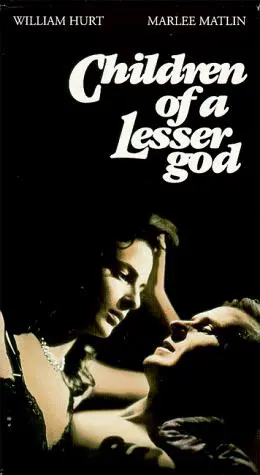Marlee Matlin’s journey is a vivid tapestry woven with passion, talent, and profound challenges. Her recent documentary provides an eye-opening exploration of the complex dynamics that encircled her meteoric rise to stardom as the first deaf actress to win an Academy Award, a triumph forever marred by the backdrop of her tumultuous relationship with the late William Hurt. Viewers are plunged into the emotional space of Matlin’s life, fully understanding how abusive patterns influenced not only her personal narrative but the legacy of her historic Oscar win.
This documentary, titled ‘Marlee Matlin: Not Alone Anymore’, digs deep into the memories of a young Matlin, who at only 19 years old was cast opposite Hurt in the critically acclaimed film ‘Children of a Lesser God’. The film balanced the delicate themes of love, communication, and struggle against the stunning brilliance of Matlin’s performance. But behind the scenes, darker realities lurked, with Matlin reflecting on how Hurt’s unhappy demeanor overshadowed the joy of receiving the Oscar that was a milestone in her career.
Unveiling the Shadows of Oscar Night
Reflecting on that momentous Oscars night in 1987, Matlin vividly recalls the juxtaposition of triumph and trepidation. The once-in-a-lifetime achievement was clouded by the looming presence of her then-partner, William Hurt. As she walked up the stairs to accept her award, dread clawed at her insides – an internal battle where excitement clashed with fear. ‘I was afraid because I knew in my gut that he wasn’t happy,’ Matlin shared in the documentary. The fear was palpable, a weight upon her shoulders as she approached the spotlight, a stark reminder of the complexities of her personal life conflicting with the professional accolades she so passionately pursued.
Understanding the Dynamics of Power and Fear
The relationship between Matlin and Hurt, fuelled by creative chemistry and personal complexities, was mired with conflict. Matlin’s candid reflections reveal an underlying current of disempowerment. She expressed regret about not fully embracing her victory, admitting, ‘I wish I had shown my joy, but I was afraid.’ This fear stemmed from the oppressive dynamics of their relationship, characterized by Hurt’s dismissive attitude and emotional volatility.

The Reality of Physical Abuse
As the documentary unfolds, Matlin discloses chilling memories of physical violence that punctuated their relationship. Friends and colleagues recalled witnessing signs of her suffering. Ron Galella, the film’s director, mentioned seeing the bruises on Matlin’s arms, a stark indication of a love tainted by aggression. Matlin’s own words resonate hauntingly as she revealed, ‘I could see that they were having arguments, fights,’ indicating that the idyllic façade of Hollywood romance was often shattered by darker domestic realities.
Matlin’s friend and interpreter, Jack Jason, vividly remembered an incident where she exited a room with a black eye. These revelations provide a raw and unfiltered access to a world often hidden behind the glamor of stardom and success. Such discussions are crucial as they highlight the often-silenced voices of abuse survivors and serve as a reminder that the journey to healing is fraught with pain and resilience.
The Aftermath of Hurt’s Legacy
The legacy of William Hurt is complicated and multifaceted. While many remember him as an Oscar-winning actor revered for his craft, his behavior cast a long shadow over his associations, especially his relationship with Matlin. After Hurt’s death in 2022, Matlin expressed a mix of respect and discomfort, dubbing him ‘one-of-a-kind’. Such ambivalence is common among survivors, torn between the love once shared and the pain inflicted.
In a revealing interview shortly after Hurt’s passing, Matlin candidly addressed the abuse allegations against him. She highlighted how their tumultuous history affected her emotionally and professionally, stating that it created challenges she continues to navigate. Her reflections provide a uncovering lens into the reality of living with a duality of admiration and pain, further amplifying the conversation around abuse in intimate relationships.

Healing from Trauma
Transitioning from victim to survivor is rarely straightforward. For Matlin, entering rehab was a significant step toward reclaiming her narrative. She shares her journey to the Betty Ford Center, where she became the facility’s first deaf patient. Matlin’s decision was partly inspired by witnessing Hurt’s own struggles with addiction, illustrating a complicated interplay of love and care amidst chaos. This element of her story emphasizes the resilience and strength it takes to confront one’s demons, revealing how even the shadows may guide the path to healing.
Matlin’s account underscores the importance of accessible resources for individuals in abusive situations, shining a light on how survivors can reclaim their lives. The support network surrounding survivors is crucial, whether through friends, family, or professional organizations dedicated to helping those impacted by domestic abuse.
The Narrative Shift in Hollywood
Matlin’s experiences reflect broader societal issues, particularly within Hollywood, where many actors have come forward to share stories of abuse. Her documentary contributes significantly to the ongoing dialogue on the imperative need for transparency and support within the entertainment industry. As the ‘Me Too’ movement continues to reshape the landscape, Matlin’s story emerges not just as an isolated incident but as a rallying point for countless others who have suffered in silence.
Her narrative drives home the necessity for systemic change, not merely within institutions but also in the cultural perceptions surrounding victims of domestic violence. By sharing her story, Matlin embarks on a mission to dismantle the stigma, encouraging others to speak out and identify unhealthy patterns in their relationships.

Building a Supportive Community
One of the most resonant themes in Matlin’s narrative is the importance of community support for survivors. Matlin’s relationships with her friends, colleagues, and support system played a pivotal role in her journey toward recovery. The shared experiences of others who resonate with Matlin’s struggles foster an environment where survivors can heal and rebuild their lives. Recognizing the strength in unity, Matlin emphasizes that stories like hers should encourage discussions, enhancing awareness and support for victims of domestic violence.
Advocacy groups and resources are becoming integral in creating safer spaces for discussion and healing. By sharing her journey, Matlin inspires many, reminding them that they are not alone in their battles. Ultimately, the act of speaking out becomes a pivotal moment of empowerment, propelling survivors from the shadows of fear towards a future illuminated by hope.
Embracing the Future Beyond Trauma
As Matlin continues her journey, her story urges society to reflect on the narratives crafted around abuse, love, and recovery. The lingering effects of her experiences with Hurt are part of a tapestry that emphasizes resilience and courage. Emphasizing that recovery doesn’t signify a return to ‘normal,’ Matlin’s story is one of ongoing growth — a testament to the strength of the human spirit.
Her ongoing advocacy highlights that while the shadows of the past may loom, they can serve as catalysts for positive change, both personally and societally. The importance of sharing these truths cannot be overstated; it fosters a culture of openness, helping individuals recognize abusive patterns before they become entrenched.

Cultivating a New Narrative
Matlin’s story continues to evolve, as does her impact on Hollywood and beyond. Her documentary serves as a crucial piece in the broader narrative of change, encouraging industry leaders and survivors alike to acknowledge the complexities of their experiences. Each conversation initiated amplifies the calls for actionable change, creating a ripple effect that challenges the status quo.
By advocating for survivors of abuse and actively participating in dialogues about mental health, rehabilitation, and recovery, Matlin redefines what it means to be a survivor. Her journey is not merely a recollection but an ongoing battle cry for progress and understanding in a world that often seeks to silence those with painful stories. Matlin stands as a beacon for others, proving that even after suffering immense heartache, individuals can emerge stronger and more committed to effecting change.
I’m Mikael, a 35-year-old Gossip Gravity Creator. I’m passionate about curating captivating content that sparks conversations and ignites curiosity. Join me on this exciting journey as we explore the fascinating world of gossip and trends together!



